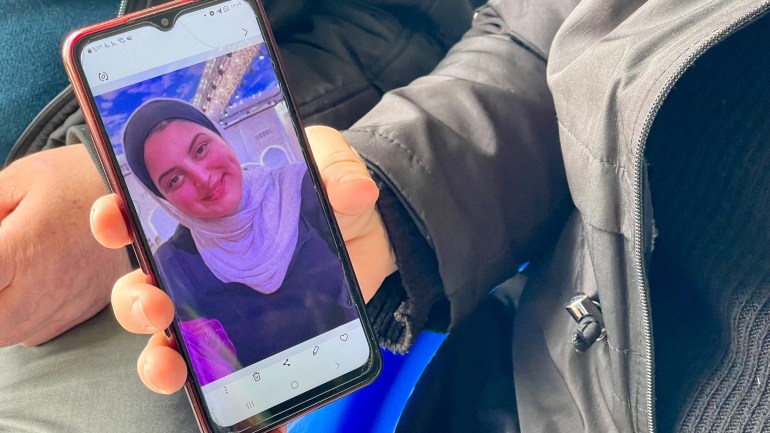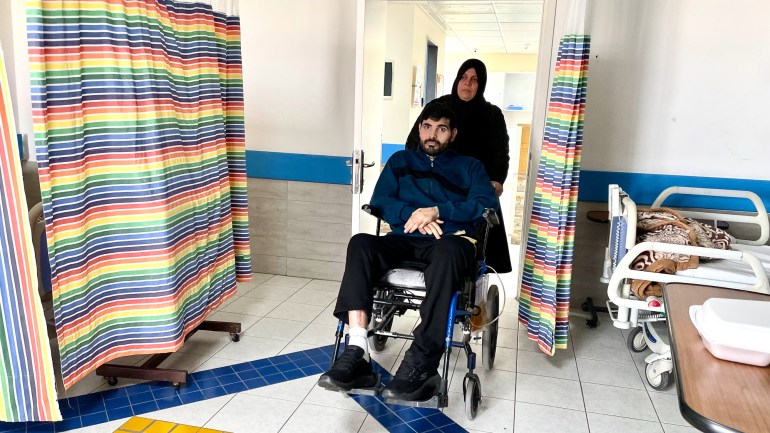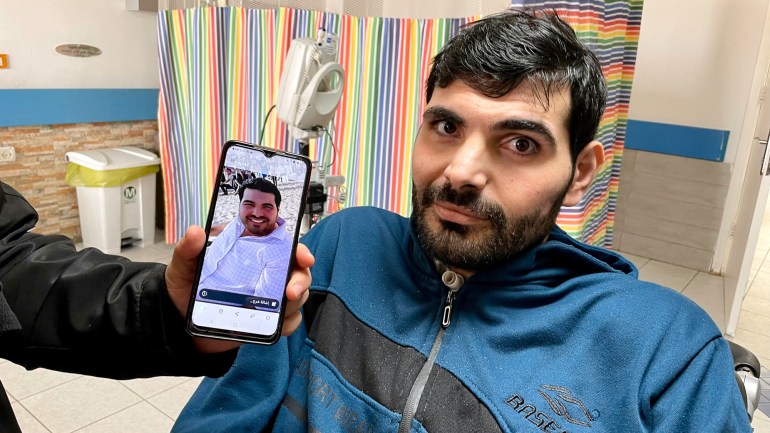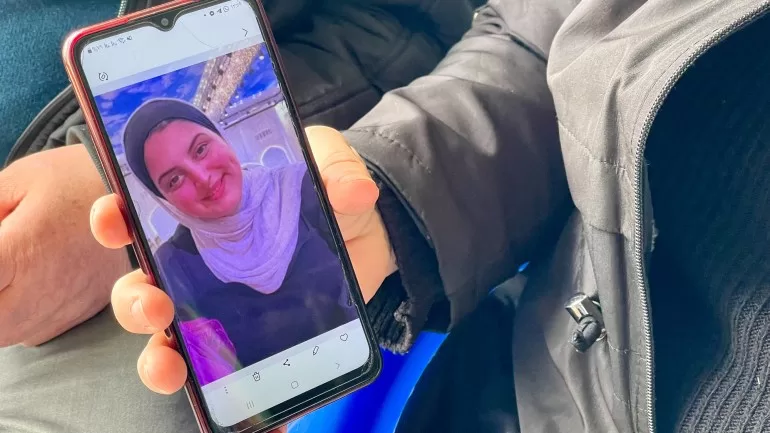Sitting beside the exhausted woman is her husband, Mazen, 56, a Gaza Ministry of Education employee who left his work to come to the occupied West Bank, where their son Fadi is being treated.
Fifty-year-old Hanan says she carries a heavy burden. As she and Mazen kept their vigil by Fadi’s bedside, praying for his healing, Israel’s war on Gaza took four of their other children from them.
“What can I say beyond what happened?” said Mazen, who did not want to, or perhaps could not, speak more.
The couple had seven children.
Four daughters: Iman, 31, who is married and lives in Canada, Malaka, 24, Nuran, 23, and Tala, 15.
Three sons: Fayez, 33, who is married and lives in the United States, Fadi, 30, and Muhammad Awad, 17.
Now they have three children: Fadi, Fayez, and Iman.
Because Malaka, Nuran, Muhammad Awad and Tala had to stay behind when Hanan and Mazen left Gaza for Fadi’s medical care and they were killed when Israel bombed the shelter they were hiding in.
Remembrance of those lost
Hanan scrolls through photos of her children on her phone, something she does with a sad familiarity as she talks about them.

“Malaka was sweet and generous, always ready to help out. Nuran loved everyone, loved life, and was loved in return, especially by her fiance in Morocco … they were going to get married after Eid al-Adha.”
As for Tala, their mother said, “I likened her to the Virgin Mary, so calm and soft, a real princess. And Muhammad Awad, he worked so hard. He had a note up by his desk reminding himself: ‘I want to get 97 percent in the high school exams so my dad is happy and I can study engineering overseas.’”
Their bustling, content family life came to a screeching halt last April when Fadi plunged five storeys while at work plastering the exterior of a building. He became quadriplegic.
Mazen initially accompanied Fadi to Haifa for treatment. He has since been moved from hospital to hospital.
It took months before Hanan was able to join them; by then the treatment was taking place at Tel Aviv’s Reuth Hospital. Hanan was meant to stay with Fadi while Mazen returned to Gaza, but she was worried about Fadi and intimidated by dealing with the Israeli hospital system, so she asked him to stay.
Little did she know, she said, that by asking him to stay, she would save his life.
The war begins
When Israel’s war on Gaza began in October, the distraught parents were still trying to find the treatment Fadi needed. He had been transferred from Haifa to Tel HaShomer Hospital in Tel Aviv, where he received some surgeries, but they were thrown out because they could not afford to complete the treatment there.
Hanan spoke to her children as often as she could, listening to them as they trembled on the phone in fear, and listening to their screams whenever a projectile landed nearby.
“They would cry on the phone: ‘Mama, we’re dying,’” she said.
“I would try to reassure them to tell that it would be over in a few days, like the wars before it did. ‘No harm or danger will befall you,’ I told them,” she said, scrubbing tears away from her eyes.
A week after the war started, Hanan’s fear for her children grew and she emailed her sisters to ask them to take care of them, writing: “My daughters’ lives are in your hands. Take care of them.”
Her older sister, who goes by Umm Fadi, sent a car to take the children from Remal in north Gaza to her house in Tal al-Hawa in the southwest.

By then, Hanan’s appeals to Palestinian officials and the community were working and she managed to get the Palestinian Authority to take on Fadi’s treatment expenses and got him admitted to a hospital in Bethlehem by October 20.
The children stayed at their aunt’s house for nearly a month, till the Israeli army stormed the neighbourhood and they fled to az-Zawayda with everyone who was in the house: their aunt, her sons with their wives, her daughters with their husbands, and all their children.
On December 13, Fadi underwent surgery at the Istishari Hospital in Ramallah before being transferred to Beit Jala Hospital in Bethlehem, where he is still being treated.
Throughout, Hanan and Mazen were sleeping in hospital wards and eating whatever the hospital gave them until the people of Bethlehem learned of their plight.
A community member gave them a furnished house, the couple recounted, and told them that the house was theirs for the duration of Fadi’s treatment. “We found safety among our people,” Hanan said.
While Hanan in Bethlehem worried about her children left behind in Gaza, they worried about their parents and asked about their brother Fadi’s health every time they spoke.
Hanan’s sister and the 29 people she was with – including Hanan’s children – were heading back to her home in Tal al-Hawa after hearing the Israeli army had withdrawn. So extensive was the damage they left behind that the group had a hard time finding their way back to the house, the children told her on the phone.

Just weeks later, the Israeli army pounced again, sending the family fleeing to Jalaa, then Remal, and back to Jalaa, where they ended up sheltering with 200 people in a school building. But the group continued to move from place to place as they sought safety, until one day Hanan heard that 16 relatives had been killed in an Israeli attack in Jalaa.
Hanan hung on to the other end of the phone, sick with worry. She nearly lost her mind when the children’s phones were off, but she heard from her niece Sahar that all was well and eventually the surviving family was able to leave once again to Tal al-Hawa.
“Imagine what it was like,” Hanan said, scrolling sadly through the photos, “to have Malaka tell me: ‘Mama, we will be martyred. Don’t cry if that happens. I would rather that than us be paralysed or lose our limbs.’”
Then she lost touch with them for days, maybe a week. Hanan lost count as she desperately tried to get through to anyone who might know what was happening. On the last night of her search, she did not sleep, up all night sending message after message to Malaka.
Hanan and Mazen had reached out to the ICRC and the Palestine Red Crescent Society, begging them to go to the house and check on the children. But Hanan did not realise that they had an answer until she walked into Fadi’s hospital room one day and saw a group of doctors and staff waiting for her.
One of the women in the group started gently asking her questions, but something told her there was another reason for their presence.
“I asked: ‘Have you received anything? My children, has something happened to them? Were they martyred?’
“I saw tears in their eyes, and one of them answered, she was wearing a Red Crescent uniform: ‘I would have loved to tell you that they weren’t martyred, but this is God’s will.’
The emergency services had finally gotten to the house on December 21, 2023, to find that everyone there had been killed about three days prior.
“I stood there in the middle of the room, begging them: ‘OK, tell me, who was martyred? Who’s still alive? Malaka? Tutu [Tala]? Muhammad?’
“She replied that everyone had been martyred, that they had been found under the rubble.
“I started screaming, just screaming, until I collapsed in their midst.”
Hanan had been working on getting the family out of Gaza before Fadi’s accident. Painstakingly, she got the children’s passports and was waiting for the war to stop so they could travel, but it was all in vain now.
“My children … my children! They were waiting for their brother Fadi to recover and for us to return,” she wept.
Now, she does not want to return to Gaza at all.
“No, I have neither people nor stones left there. The house has collapsed and my children have been martyred. To whom will I return?
“Everyone has gone and my children [and] my sister have been martyred, so many of my relatives.”
